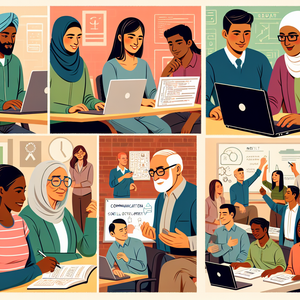The Role of HR Tech in Shaping Employee Experience

HR technology encompasses a wide array of tools and platforms specifically designed to streamline HR processes and enhance the overall employee experience. Here are some of the key categories: 1. **Employee Engagement Platforms**: Tools like Officevibe and TINYpulse allow organizations to gather real-time feedback from employees. By utilizing pulse surveys and anonymous feedback features, HR teams can gauge engagement levels and proactively address concerns. This fosters a more open and responsive workplace culture. 2. **Learning Management Systems (LMS)**: Platforms such as Cornerstone OnDemand and Udemy for Business provide tailored learning opportunities for employees, empowering them to develop their skills independently. By investing in employee development, organizations demonstrate their commitment to growth and career advancement. 3. **Performance Management Software**: Tools like Lattice and 15Five facilitate continuous performance conversations, moving away from traditional annual reviews. This ongoing dialogue encourages regular feedback and recognition, fostering a culture of appreciation that enhances employee morale.
Case Studies of Successful Implementation
### Case Study 1: Salesforce Salesforce, a leading cloud-based software company, has made significant progress in enhancing employee experience through HR tech. They utilize an employee engagement platform known as the "Ohana Culture," which emphasizes community, customer focus, and employee well-being. By leveraging data analytics, Salesforce tailors its programs to meet the unique needs of its diverse workforce. Regular pulse surveys provide valuable insights that help the HR team make informed decisions about engagement initiatives, resulting in increased employee satisfaction and retention rates. ### Case Study 2: Unilever Unilever, a global consumer goods company, has embraced technology to revolutionize its onboarding process. The company implemented an innovative LMS to provide new hires with a seamless and engaging onboarding experience. Through interactive modules and personalized learning paths, new employees quickly acclimate to the company culture and their roles. This tech-driven approach not only enhances the onboarding experience but also accelerates productivity, as new hires feel more connected and informed from day one. ### Case Study 3: HubSpot HubSpot, a prominent marketing and sales software firm, has leveraged performance management software to cultivate a feedback-rich environment. Their "Check-In" tool allows employees to set personal goals, share progress, and receive continuous feedback from managers and peers. This regular feedback loop has led to higher levels of engagement and a sense of ownership among employees regarding their performance, ultimately contributing to a more motivated and productive workforce.
The role of HR technology in shaping employee experience is undeniably transformative. By leveraging innovative tools and data insights, organizations can create a work environment that fosters engagement, satisfaction, and productivity. The case studies of Salesforce, Unilever, and HubSpot illustrate the tangible benefits that arise from embracing HR tech to enhance employee experience. As companies navigate the complexities of the modern workplace, prioritizing employee experience through technology will be essential for attracting and retaining top talent. In an era where employee expectations are evolving rapidly, organizations that invest in HR tech are not only likely to thrive but will also cultivate a culture of engagement that leads to lasting success. In addition, the integration of HR tech offers opportunities for all individuals, regardless of background, to access career development tools, performance feedback, and engagement platforms that enhance their overall workplace experience. By fostering such inclusive practices, organizations can build a more diverse and satisfied workforce, ultimately driving innovation and growth.
HR Technology Specialist
Google, financial institutions, large manufacturing companies
Core Responsibilities
Implement and manage HR tech platforms, ensuring alignment with organizational needs and employee engagement strategies.
Analyze HR data and metrics to identify trends, providing insights for decision-making and strategic planning.
Collaborate with HR teams to develop training materials and sessions for employees on new technologies.
Required Skills
Proficiency in HR software and tools such as Workday, BambooHR, or SAP SuccessFactors.
Strong analytical skills and experience with data visualization tools like Tableau or Power BI.
Excellent communication skills for conveying technical information to non-technical staff.
Employee Experience Manager
Fortune 500 companies, large retailers, consultancy firms
Core Responsibilities
Design and implement initiatives that enhance employee engagement and satisfaction using HR technology.
Conduct regular surveys to gather employee feedback and assess the effectiveness of existing programs.
Partner with cross-functional teams to create a cohesive culture that aligns with the company’s mission and values.
Required Skills
Experience in project management and familiarity with employee engagement platforms like Culture Amp or Gallup.
Strong interpersonal skills to effectively communicate with diverse teams and stakeholders.
A background in organizational psychology or human resources is advantageous.
Learning and Development (L&D) Coordinator
Educational institutions, corporate training companies, tech startups
Core Responsibilities
Manage and enhance the organization’s Learning Management System (LMS), ensuring it meets the evolving needs of employees.
Develop and curate training content, including e-learning modules, workshops, and webinars that align with business objectives.
Evaluate training programs for effectiveness and make data-driven recommendations for improvements.
Required Skills
Proficiency in LMS software such as Cornerstone OnDemand, Moodle, or LinkedIn Learning.
Strong organizational skills and the ability to manage multiple projects simultaneously.
Familiarity with instructional design principles and adult learning theories.
People Analytics Consultant
Consulting firms, large corporations, tech companies
Core Responsibilities
Utilize data analytics to assess workforce trends and provide actionable insights to improve employee experience and performance.
Develop and manage dashboards and reporting systems that track key HR metrics.
Collaborate with HR and executive leadership to align data strategies with organizational goals.
Required Skills
Expertise in statistical analysis and familiarity with tools such as R, Python, or SQL.
Strong problem-solving skills and ability to translate complex data into understandable formats for stakeholders.
Experience in HR principles and data privacy regulations.
Performance Management Specialist
Large corporations, tech companies, HR consulting firms
Core Responsibilities
Facilitate the implementation of performance management systems that support continuous feedback and employee development.
Train managers and employees on best practices for performance evaluations and feedback conversations.
Analyze performance data to identify trends and recommend improvements to talent management strategies.
Required Skills
Knowledge of performance management software such as Lattice or Reflektive and experience with goal-setting frameworks like OKRs.
Strong communication and negotiation skills to mediate performance-related discussions.
A background in human resources, organizational behavior, or a related field is preferred.


